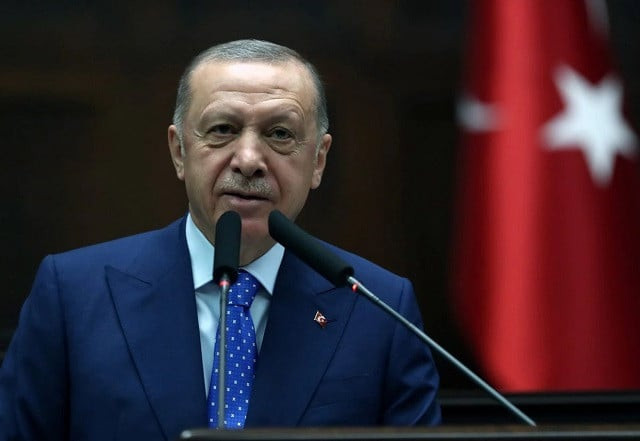Erdogan ahead in Turkey initial vote results, but his margin is expected to narrow
HaberTurk said the results were based on 9.1pc of the ballot boxes counted

Preliminary results from Turkey’s presidential election on Sunday showed Tayyip Erdogan ahead with 59.47 per cent compared to opposition rival Kemal Kilicdaroglu with 34.79pc, though pollsters expected the gap to narrow in the tight contest.
HaberTurk and other Turkish broadcasters said the results, given less than two hours after polling stations closed, were based on 9.1pc of the ballot boxes counted.
The head of Turkey’s High Election Board earlier lifted a publication ban and said to wait until it announces official tentative results later.
Pre-election polls had given the edge to Kilicdaroglu, who pledges to roll back much of Erdogan’s two-decade legacy.
Turks voted in a pivotal election today, poised either to unseat President Tayyip Erdogan and halt his government’s increasingly authoritarian path or usher in a third decade of his rule.
The vote will decide not only who leads Turkiye, a NATO-member country of 85 million, but also how it is governed, where its economy is headed amid a deep cost of living crisis, and the shape of its foreign policy.
Opinion polls have given Erdogan’s main challenger, Kemal Kilicdaroglu, who heads a six-party alliance, a slight lead, with two polls on Friday showing him above the 50pc threshold needed to win outright. If neither of them wins more than 50pc of the vote on Sunday, a runoff will be held on May 28.
Polling
Polling stations in the election, which is also for a new parliament, close at 5pm (1400 GMT). Turkish law bans the reporting of any results until 9pm By late on Sunday there could be a good indication of whether there will be a runoff.
“I see these elections as a choice between democracy and dictatorship,” said Ahmet Kalkan, 64, as he voted in Istanbul for Kilicdaroglu, echoing critics who fear Erdogan will govern ever more autocratically if he wins.
“I chose democracy and I hope that my country chooses democracy,” said Kalkan, a retired health sector worker.
Erdogan, 69 and a veteran of a dozen election victories, says he respects democracy and denies being a dictator.
Illustrating how the president still commands support, Mehmet Akif Kahraman, also voting in Istanbul, said Erdogan still represented the future even after two decades in power.
“God willing, Turkiye will be a world leader,” he said.
Voters elsewhere in the country also expressed views for and against Erdogan, a polarising figure hoping to extend his tenure as the longest-serving ruler since modern Turkiye was established 100 years ago.
Also read: Turkey votes: Pivotal elections could end Erdogan's 20-year rule
The election takes place three months after earthquakes in southeast Turkiye killed more than 50,000 people. Many in the affected provinces have expressed anger over the slow initial government response but there is little evidence that the issue has changed how people will vote.
Erdogan, voting in Istanbul, shook the hands of election officials and spoke to a TV reporter in the polling station.
“We pray to the Lord for a better future for our country, nation and Turkish democracy,” he said.
A smiling Kilicdaroglu, 74, voted in Ankara and emerged to applause from the waiting crowd.
“I offer my most sincere love and respect to all my citizens who are going to the ballot box and voting. We all miss democracy so much,” he told the assembled media.
The parliamentary vote is a tight race between the People’s Alliance comprising Erdogan’s Islamist-rooted AK Party (AKP) and the nationalist MHP and others, and Kilicdaroglu’s Nation Alliance formed of six opposition parties, including his secularist Republican People’s Party (CHP), established by Turkiye’s founder Mustafa Kemal Ataturk.
Voting was being monitored by a mission from the Organization for Security and Cooperation in Europe, which said it would deliver a preliminary statement on Monday on its findings.
Change or continuity
Erdogan, a powerful orator and master campaigner, has pulled out all the stops on the campaign trail. He commands fierce loyalty from pious Turks who once felt disenfranchised in secular Turkiye and his political career has survived an attempted coup in 2016, and numerous corruption scandals.
However, if Turks do oust Erdogan it will be largely because they saw their prosperity and ability to meet basic needs decline, with inflation that topped 85pc in Oct. 2022 and a collapse in the lira currency.
Kilicdaroglu promises that if he wins he will return to orthodox economic policies from Erdogan’s heavy management.
Kilicdaroglu also says he would seek to return Turkiye to the parliamentary system of governance, from Erdogan’s executive presidential system passed in a referendum in 2017. He has also promised to restore the independence of a judiciary that critics say Erdogan has used to crack down on dissent.
Erdogan has taken tight control of most of Turkiye’s institutions and sidelined liberals and critics. Human Rights Watch, in its World Report 2022, said Erdogan’s government has set back Turkiye’s human rights record by decades.
Kurdish voters, who account for 15-20pc of the electorate, will play a vital role, with the Nation Alliance unlikely to attain a parliamentary majority by itself.
The pro-Kurdish Peoples’ Democratic Party (HDP) is not part of the main opposition alliance but fiercely opposes Erdogan after a crackdown on its members in recent years.
The HDP has declared its support for Kilicdaroglu for the presidency. It is entering the parliamentary elections under the emblem of the small Green Left Party due to a court case filed by a top prosecutor seeking to ban the HDP over links to Kurdish militants, which the party denies.



















COMMENTS
Comments are moderated and generally will be posted if they are on-topic and not abusive.
For more information, please see our Comments FAQ